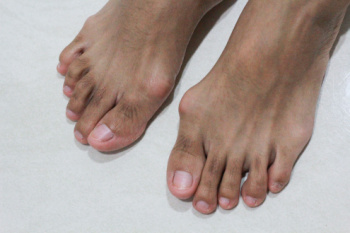Items filtered by date: November 2024
Heel Pain in Active Children

Heel pain is common among active children, especially those who engage in sports that involve running and jumping. One frequent cause of heel pain in young athletes is termed Sever’s disease, a condition that typically affects children between 8 and 14 years old. This condition arises when the growth area where the Achilles tendon connects to the heel bone becomes inflamed due to the rapid growth of bones and soft tissues during puberty. Signs of Sever’s disease include pain in one or both heels, especially during or after physical activity, limping, and a tendency to walk on tiptoe. Various factors, such as flat foot posture, increased weight, and changes in footwear, may contribute to the pain. A podiatrist can assess and help manage symptoms by recommending specific footwear, using orthotics if necessary, and educating on activity modification. This approach helps children stay active while minimizing heel pain. If your active child complains of heel pain, it is suggested that you make an appointment with a podiatrist for appropriate treatment.
Sever's disease often occurs in children and teens. If your child is experiencing foot or ankle pain, see one of our podiatrists from Foot Care Centers of Palm Beach. Our doctors can treat your child’s foot and ankle needs.
Sever’s Disease
Sever’s disease is also known as calcaneal apophysitis, which is a medical condition that causes heel pain I none or both feet. The disease is known to affect children between the ages of 8 and 14.
Sever’s disease occurs when part of the child’s heel known as the growth plate (calcaneal epiphysis) is attached to the Achilles tendon. This area can suffer injury when the muscles and tendons of the growing foot do not keep pace with bone growth. Therefore, the constant pain which one experiences at the back of the heel will make the child unable to put any weight on the heel. The child is then forced to walk on their toes.
Symptoms
Acute pain – Pain associated with Sever’s disease is usually felt in the heel when the child engages in physical activity such as walking, jumping and or running.
Highly active – Children who are very active are among the most susceptible in experiencing Sever’s disease, because of the stress and tension placed on their feet.
If you have any questions, please feel free to contact our office located in Boynton Beach, FL . We offer the newest diagnostic and treatment technologies for all your foot and ankle injuries.
Custom Orthotics Seasonal - Any Season

Rain or shine, snow or sleet, Custom Orthotics have your feet covered! As the seasons change, ensure your steps remain comfortable and supported. Custom Orthotics adapt to your footwear, from summer sandals to winter boots, providing consistent relief and alignment. Don't let the changing weather dictate your foot comfort. Step confidently year-round and experience the difference with Custom Orthotics. Call today for more information.
Diabetic Neuropathy and the Feet

Diabetic neuropathy is nerve damage that frequently affects the feet and lower leg. It results from high blood sugar levels, causing numbness, tingling, or burning sensations in the feet, along with muscle weakness that can impact walking. Reduced sensation also makes it difficult to feel injuries, leading to unnoticed cuts or sores that heal slowly. Left untreated, these injuries may worsen, heightening the risk of infections and ulcers. For those with diabetic neuropathy, routine foot care is essential to prevent complications. A podiatrist can assist by evaluating the feet, monitoring any signs of damage, and providing guidance on footwear and skin care. This foot doctor can also suggest lifestyle modifications to support foot health and help manage the condition effectively. Regular checkups with a podiatrist help to reduce the risk of severe foot problems that are associated with diabetic neuropathy. If you have symptoms of neuropathy in the feet, it is suggested that you schedule an appointment with a podiatrist for an exam and regular treatment.
Neuropathy
Neuropathy can be a potentially serious condition, especially if it is left undiagnosed. If you have any concerns that you may be experiencing nerve loss in your feet, consult with one of our podiatrists from Foot Care Centers of Palm Beach. Our doctors will assess your condition and provide you with quality foot and ankle treatment for neuropathy.
What Is Neuropathy?
Neuropathy is a condition that leads to damage to the nerves in the body. Peripheral neuropathy, or neuropathy that affects your peripheral nervous system, usually occurs in the feet. Neuropathy can be triggered by a number of different causes. Such causes include diabetes, infections, cancers, disorders, and toxic substances.
Symptoms of Neuropathy Include:
- Numbness
- Sensation loss
- Prickling and tingling sensations
- Throbbing, freezing, burning pains
- Muscle weakness
Those with diabetes are at serious risk due to being unable to feel an ulcer on their feet. Diabetics usually also suffer from poor blood circulation. This can lead to the wound not healing, infections occurring, and the limb may have to be amputated.
Treatment
To treat neuropathy in the foot, podiatrists will first diagnose the cause of the neuropathy. Figuring out the underlying cause of the neuropathy will allow the podiatrist to prescribe the best treatment, whether it be caused by diabetes, toxic substance exposure, infection, etc. If the nerve has not died, then it’s possible that sensation may be able to return to the foot.
Pain medication may be issued for pain. Electrical nerve stimulation can be used to stimulate nerves. If the neuropathy is caused from pressure on the nerves, then surgery may be necessary.
If you have any questions, please feel free to contact our office located in Boynton Beach, FL . We offer the newest diagnostic and treatment technologies for all your foot care needs.
It's Time for Beautiful Feet
Causes and Symptoms of Bunions

A bunion is a bony bump that forms on the joint at the base of the big toe, typically due to misalignment of some of the bones in the front of the foot. This misalignment can force the tip of the big toe toward the smaller toes, causing the base of the joint to protrude. Common causes of bunions include wearing tight or narrow footwear, hereditary foot shapes, and medical conditions like arthritis. Symptoms include swelling, redness, and persistent pain at the big toe joint. A podiatrist can assess the severity of the bunion and recommend appropriate treatment options. Non-surgical choices include wearing shoes with a wider toe box, using protective pads, or applying orthotic devices to redistribute pressure. If non-surgical measures are ineffective, surgery may be considered to realign the bones or remove inflamed tissue. If you have developed a bunion that is causing pain, it is suggested that you schedule an appointment with a podiatrist for an exam and treatment.
If you are suffering from bunions, contact one of our podiatrists of Foot Care Centers of Palm Beach. Our doctors can provide the care you need to keep you pain-free and on your feet.
What Is a Bunion?
A bunion is formed of swollen tissue or an enlargement of boney growth, usually located at the base joint of the toe that connects to the foot. The swelling occurs due to the bones in the big toe shifting inward, which impacts the other toes of the foot. This causes the area around the base of the big toe to become inflamed and painful.
Why Do Bunions Form?
Genetics – Susceptibility to bunions are often hereditary
Stress on the feet – Poorly fitted and uncomfortable footwear that places stress on feet, such as heels, can worsen existing bunions
How Are Bunions Diagnosed?
Doctors often perform two tests – blood tests and x-rays – when trying to diagnose bunions, especially in the early stages of development. Blood tests help determine if the foot pain is being caused by something else, such as arthritis, while x-rays provide a clear picture of your bone structure to your doctor.
How Are Bunions Treated?
- Refrain from wearing heels or similar shoes that cause discomfort
- Select wider shoes that can provide more comfort and reduce pain
- Anti-inflammatory and pain management drugs
- Orthotics or foot inserts
- Surgery
If you have any questions, please feel free to contact our office located in Boynton Beach, FL . We offer the newest diagnostic and treatment technologies for all your foot care needs.
Essential Shoes for Nurses

Nurses spend long hours on their feet, making the right footwear vital for comfort and health. Clogs and crocs are popular choices due to their easy slip-on design and excellent arch support. These styles offer cushioning and are often made from materials that provide breathability, helping to keep feet comfortable throughout the day. Tennis sneakers are also favored, as they provide stability and support for various movements required in a healthcare setting. Specialized healthcare-focused footwear is designed with features like anti-slip soles and antimicrobial properties, ensuring both safety and hygiene. Prioritizing comfort in shoe selection can help reduce fatigue, prevent foot pain, and lower the risk of injury. Foot injuries can happen from wearing the wrong shoes during the work day. If this applies to you, it is suggested that you consult a podiatrist who can treat various foot conditions, and offer you advice about proper workday footwear.
While working on the feet, it is important to take the proper care of them. For more information about working on your feet, contact one of our podiatrists from Foot Care Centers of Palm Beach. Our doctors will treat your foot and ankle needs.
Working on Your Feet
Standing on your feet for long periods of time can cause stress and pain in your feet. Your whole body may experience change in terms of posture, back pain, bunions, callouses and or plantar warts. There are ways to avoid these conditions with proper foot care, smart choices and correct posture.
Positive Changes
Negative heeled shoe – Choosing this shoe type places the heel slightly lower than the ball of the foot. These are great for overall foot health. Find shoes that fit you correctly.
Go barefoot – Our feet were not designed to be enclosed for all hours of the day. Try to periodically expose your feet to air.
Eliminate Pain
Foot Exercises – Performing simple exercises, incorporating yoga and doing stretches are beneficial. This will allow increased blood flow to the area and muscles of the foot.
Achilles tendon – Stretching the foot out flat on the floor will relax the calf muscles and tendon. These exercises can be performed almost anywhere. Make sure you add these exercises to your daily regimen.
With a little bit of this information and knowing more about foot health, you will notice changes. Foot stretches and proper footwear will help with pain and prevent further issues.
If you have any questions please feel free to contact our office located in Boynton Beach, FL . We offer the newest diagnostic and treatment technologies for all your foot and ankle needs.

